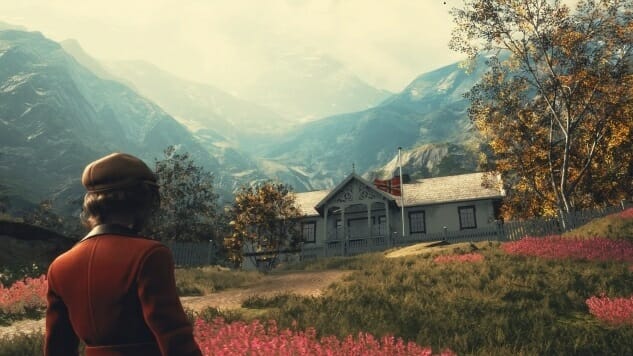
Draugen, at first glance, looks like a love letter to Nordic landscapes and quaint, bucolic villages. And thankfully, that first glance of beauty in natural mundanity never really wears off.
Draugen is set in the Nordic town of Graavik, an impossibly beautiful, sleepy little town that is quaint and tucked in rolling green hills amid flowing creeks and streams. But it is too sleepy. In fact, the town is empty. That is when the videogame’s core characters arrive. Enter Teddy Harden—an unlikeable and slightly snobby man who has read one-too-many gumshoe dime-novels—and Lissie, who is the more likable and better written half of the duo. She is young, adventurous and always ready to dive head first into any and all scenarios. She is the perfect foil and friend to the player-controlled Teddy Harden, who, I cannot emphasize this enough, is quite the serious fellow. His rigidness eventually pays off in search of his lost sister Betty, and just why the entire population of Graavik seems to have gone missing. Cue the slow drip-like introduction of Norwegian folklore and sinister magical realism in the guise of a noir tale.
Draugen is a first-person adventure game that unfolds and flows at a pace that matches its environment. It is slow and meandering, with story-threads reaching deadends and false starts. In many ways, it resembles the magical slice-of-(kind-of)-life realism that is apparent in many Cormac McCarthy novels. Though it is well paced and none of its puzzles ever left me wondering why I have to mix a battery with a wheel of cheese to start a car, its narrative left me wanting something more—anything more.
The town of Graavik, underneath its beauty and quaint peacefulness, holds nothing but grief—traumas of the past, traumas of the present and traumas yet to come. Trauma and grief is exemplified through Draugen’s gameplay. Almost everything that Teddy interacts with has a small story to tell, and these stories rarely ever surface anything as beautiful and kind as the game’s landscape. In interacting with items in the environment, the game’s puzzles come into focus, and they usually follow one line of interaction. Player interacts with object, player engages in conversation with Lissie in regards to the item and what clues said item holds, and then chooses how the conversation unfolds by choosing which facts and tidbits of information to discuss with Lissie. Then, as this is a detective adventure game, narrative development occurs and the story’s obfuscated pieces start to come together.
Yet, once Draugen’s story is brought to light and the central mystery starts to become clear, it begins to buckle underneath its own ambition. From the get-go, I was left wanting more from the game’s dialogue and character development, and the story’s final act and big revelations just do not land because the narrative road to such rushed conclusions feels neither warranted or as emotional as the game wants it to be. Draugen wields grief and emotion with as deft a touch as Gallagher wields a sledgehammer. But Draugen’s place-setting and the implied storytelling that is tied to the town itself is genuinely compelling and, at times, fantastic.
Draugen’s central narrative is at contrast with its setting. Where the story falls flat, the worldbuilding excels. The detective-like gameplay allows the world to become a character in and of itself and, at times, I wished that there was no core central narrative. I would be perfectly content with exploring this beautiful Norwegian town, rummaging through the town’s ephemera of life and taking it all in at my own pace—as slow and methodical as the bucolic surroundings imply. At just under three hours, Draugen is a perfectly fine excuse to interact with and explore a beautifully realized world; just be ready to come to terms with how forgettable its story is.
Draugen was developed and published by Red Thread Games. Our review is based on the PC version. It is also available for Xbox One and PlayStation 4.
Cole Henry is an intern at Paste. He’s on Twitter @colehenry19.